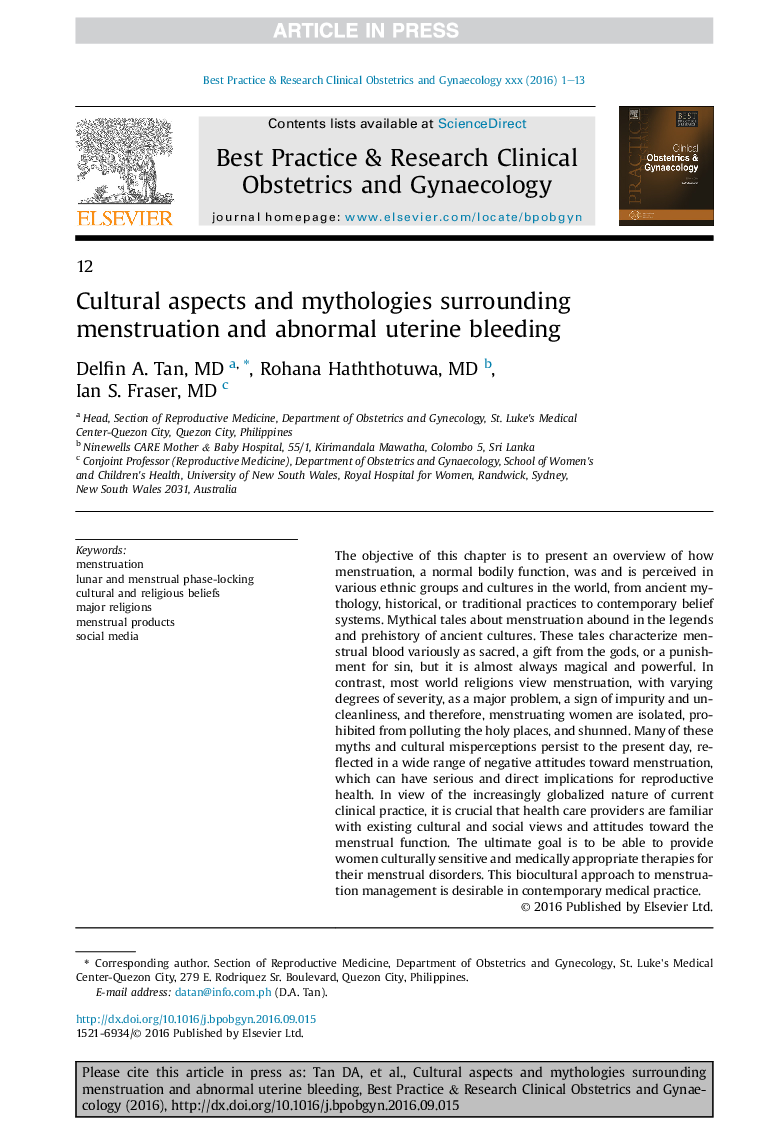| کد مقاله | کد نشریه | سال انتشار | مقاله انگلیسی | نسخه تمام متن |
|---|---|---|---|---|
| 5691436 | 1599300 | 2017 | 13 صفحه PDF | دانلود رایگان |
عنوان انگلیسی مقاله ISI
Cultural aspects and mythologies surrounding menstruation and abnormal uterine bleeding
ترجمه فارسی عنوان
جنبه های فرهنگی و اسطوره های مربوط به قاعدگی و خونریزی غیر طبیعی رحم
دانلود مقاله + سفارش ترجمه
دانلود مقاله ISI انگلیسی
رایگان برای ایرانیان
کلمات کلیدی
قاعدگی زنان، قفل قمری و قاعدگی، عقاید فرهنگی و مذهبی، ادیان بزرگ، محصولات قاعدگی، رسانه های اجتماعی،
ترجمه چکیده
هدف این فصل، ارائه خلاصه ای از نحوه قاعدگی، عملکرد طبیعی بدن است که در گروه های مختلف قومی و فرهنگی در جهان، از اسطوره های تاریخی، تاریخی یا شیوه های سنتی به سیستم های باور معاصر درک شده است. افسانه های افسانه ای در مورد قاعدگی در افسانه ها و پیش از تاریخ های فرهنگ های باستانی فراوان است. این داستان ها خون قاعدگی را به صورت مقدس، هدیه خدایان یا مجازات گناه مشخص می کنند، اما تقریبا همیشه جادویی و قدرتمند است. در مقابل، اغلب ادیان جهان، قاعدگی را با شدت های مختلف در نظر می گیرند، به عنوان یک مشکل بزرگ، نشانه ناخوشی و عدم تمیز بودن، و در نتیجه، زنان قاعدگی جدا هستند، ممنوع است از آلودگی مکان های مقدس و مانع. بسیاری از این اسطوره ها و تصورات غلط فرهنگی، تا امروز ادامه دارد، که در طیف وسیعی از نگرش منفی به قاعدگی منعکس شده است، که می تواند پیامدهای جدی و مستقیم برای سلامت تولید مثل را داشته باشد. با توجه به ماهیت به طور فزاینده جهانی شدن عمل بالینی فعلی، بسیار مهم است که ارائه دهندگان مراقبت های بهداشتی با دیدگاه ها و نگرش های فرهنگی و اجتماعی موجود در رابطه با عملکرد قاعدگی آشنا باشند. هدف نهایی این است که بتوانیم زنان را برای اختلالات قاعدگی خود از نظر فرهنگی حساس و پزشکی در نظر بگیریم. این رویکرد بیولوژیکی به مدیریت قاعدگی در عمل معاصر پزشکی مطلوب است.
موضوعات مرتبط
علوم پزشکی و سلامت
پزشکی و دندانپزشکی
زنان، زایمان و بهداشت زنان
چکیده انگلیسی
The objective of this chapter is to present an overview of how menstruation, a normal bodily function, was and is perceived in various ethnic groups and cultures in the world, from ancient mythology, historical, or traditional practices to contemporary belief systems. Mythical tales about menstruation abound in the legends and prehistory of ancient cultures. These tales characterize menstrual blood variously as sacred, a gift from the gods, or a punishment for sin, but it is almost always magical and powerful. In contrast, most world religions view menstruation, with varying degrees of severity, as a major problem, a sign of impurity and uncleanliness, and therefore, menstruating women are isolated, prohibited from polluting the holy places, and shunned. Many of these myths and cultural misperceptions persist to the present day, reflected in a wide range of negative attitudes toward menstruation, which can have serious and direct implications for reproductive health. In view of the increasingly globalized nature of current clinical practice, it is crucial that health care providers are familiar with existing cultural and social views and attitudes toward the menstrual function. The ultimate goal is to be able to provide women culturally sensitive and medically appropriate therapies for their menstrual disorders. This biocultural approach to menstruation management is desirable in contemporary medical practice.
ناشر
Database: Elsevier - ScienceDirect (ساینس دایرکت)
Journal: Best Practice & Research Clinical Obstetrics & Gynaecology - Volume 40, April 2017, Pages 121-133
Journal: Best Practice & Research Clinical Obstetrics & Gynaecology - Volume 40, April 2017, Pages 121-133
نویسندگان
Delfin A. MD, Rohana MD, Ian S. MD,
